God Respects Us When We Work, but Loves Us When We Dance Blu-ray Movie
HomeGod Respects Us When We Work, but Loves Us When We Dance Blu-ray Movie 
Criterion | 1968 | 20 min | Not rated | No Release Date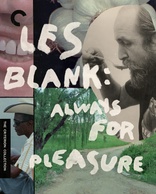
Price
Movie rating
6.5 | / 10 |
Blu-ray rating
| Users | 0.0 | |
| Reviewer | 3.5 | |
| Overall | 3.5 |
Overview
God Respects Us When We Work, but Loves Us When We Dance (1968)
Hippies and flower children dance and create rituals at the historic Los Angeles "Love-In" of Easter Sunday, 1967.
Director: Les Blank| Documentary | Uncertain |
| Music | Uncertain |
| Short | Uncertain |
Specifications
Video
Video codec: MPEG-4 AVC
Video resolution: 1080p
Aspect ratio: 1.33:1
Audio
English: LPCM Mono (48kHz, 24-bit)
Subtitles
None
Discs
50GB Blu-ray Disc
Single disc (1 BD)
Playback
Region A (locked)
Review
Rating summary
| Movie | 3.5 | |
| Video | 4.0 | |
| Audio | 4.0 | |
| Extras | 0.5 | |
| Overall | 3.5 |
God Respects Us When We Work, but Loves Us When We Dance Blu-ray Movie Review
Reviewed by Jeffrey Kauffman July 7, 2019 Note: This film is available as part of Les
Blank: Always for Pleasure.
Chances are that unless you have a specialized interest in some of the indigenous folk music(s) of the United States, your recognition of the name
Les
Blank, if indeed you recognize it at all, may well come courtesy of
Burden of Dreams (note that the link points to a DVD, not a Blu-ray), Blank’s fascinating documentary about the filming of Werner
Herzog’s Fitzcarraldo. That piece was actually kind of an
outlier in Blank’s oeuvre, a large body of work that otherwise tended to focus primarily on musicians (though there are a couple of
exceptions in this set). Criterion’s collection of fourteen Blank
documentaries may understandably be thought of as a niche product, but for those interested in this subject, it’s a virtual smorgasbord of great
performances and at least some biographical data.
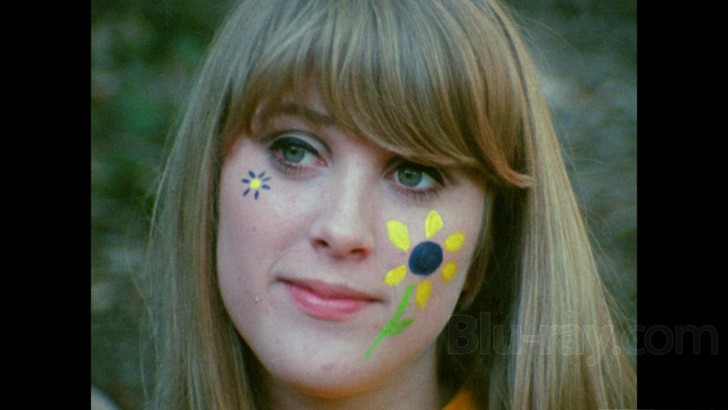
There's a kind of cheeky adage that states that if you remember the sixties, you weren't really there. Thankfully (at least for those who do want to remember the sixties), Les Blank was most definitely there, as evidenced quite nicely by this freewheeling "love in" Blank captured in Los Angeles at the height of the hippie movement on Easter Day, 1967. This is a largely formless piece, one that drifts like some of the obviously drugged frolickers at Elysian Park, with an assortment of images of dancing and bubble blowing (there's no dialogue of any kind, just a kind of low tech rock soundtrack). This is a fantastically fun document of a time where a whole generation seemed to believe that they could change the world by getting high and listening to music.
God Respects Us When We Work, but Loves Us When We Dance Blu-ray Movie, Video Quality 
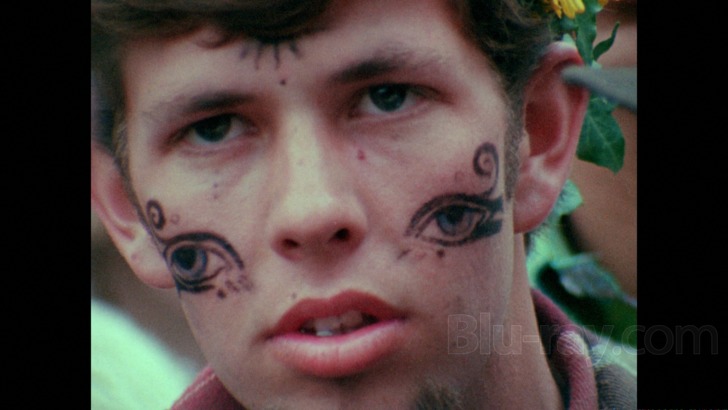
God Respects Us When We Work, But Loves Us When We Dance is presented on Blu-ray courtesy of the Criterion Collection with an AVC
encoded 1080p transfer in 1.33:1.
Criterion's insert booklet has the following information on the transfers in this set:
All fourteen films are presented in their original aspect ratio of 1.33:1. On widescreen televisions, black bars will appear on the left and right side of the image to maintain the proper screen format. These new digital transfers were created in 2K resolution on a Scanity film scanner from internegatives at Technicolor Los Angeles. Thousands of instances of dirt, debris, scratches, splices, warps, jitter, and flicker were manually removed using MTI's DRS and Pixel Farm's PFClean, while Digital Vision's Phoenix was used for small dirt, grain, and noise management.This is by and large a very pleasing looking transfer, one with a naturally resolving grain field and some especially vivid reds, blues and purples. The piece has a surplus of close-ups on faces (many adorned with paint), and detail levels tend to be very good to excellent throughout these scenes. Blank opts for some quasi-montages with a series of optical dissolves, and detail levels understandably lessen in these sequences.
God Respects Us When We Work, but Loves Us When We Dance Blu-ray Movie, Audio Quality 
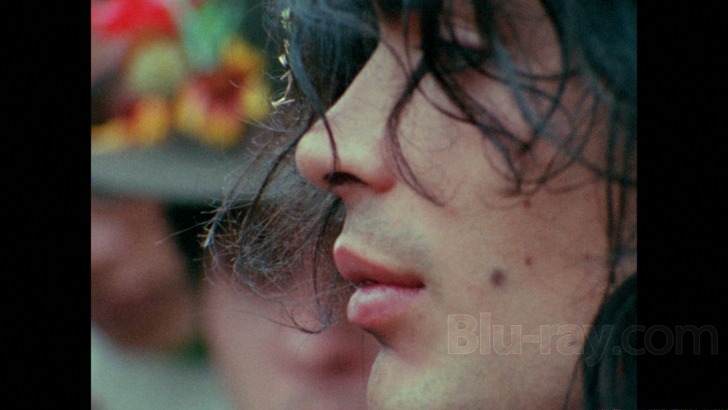
Criterion's insert booklet has the following information on the soundtracks:
The original monaural soundtracks for The Blues Accordin' to Lightnin' Hopkins; A Well Spent Life; Dry Wood; Always for Pleasure; Garlic is as Good as Ten Mothers; Sprout Wings and Fly; In Heaven There is No Beer?; Gap-Toothed Women; Yum, Yum, Yum! A Taste of Creole and Cajun Cooking; and The Maestro: King of the Cowboy Artists were remastered at 24-bit from 35 mm full-coat magnetic tracks. The original monaural soundtrack for Hot Pepper was remastered at 24-bit from the original 16 mm full-coat magnetic track. The original monaural soundtrack for God Respects Us When We Work, but Loves Us When We Dance was remastered at 24-bit from a restored DA-98 tape and the restored 35 mm full-coat magnetic track. The original monaural soundtrack for Spend It All was remastered at 24-bit from a restored WAV file. And the original stereo soundtrack for Sworn to the Drum: A Tribute to Francisco Aguabella was remastered at 24-bit from the original 16 mm full-coat magnetic track. Clicks, thumps, hiss, hum, and crackle were manually removed using Pro Tools HD, AudioCube's integrated workstation, and iZotope RX3.There nothing but music on this LPCM Mono track, and everything sounds spry if narrow. The music is credited to an aggregation called The Spontaneous Combustion (the credits say "Yay!" underneath the name of the band, somewhat humorously), and the sound is kind of a jangly, folk inflected rock sound, with "quaint" instruments like what sounds like a Farfisa organ to me featured prominently at times.
God Respects Us When We Work, but Loves Us When We Dance Blu-ray Movie, Special Features and Extras 
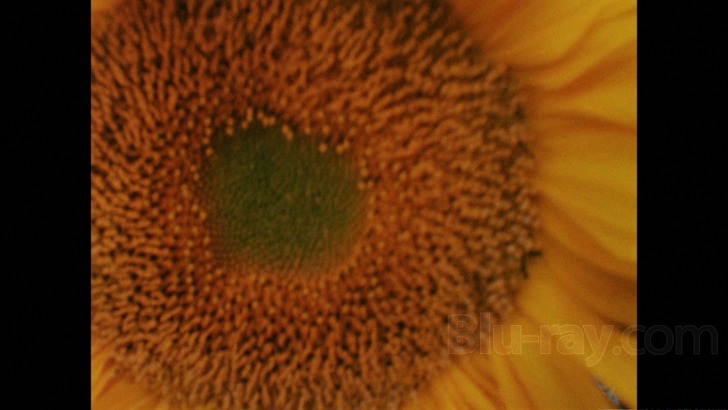
- Flower Power (1080p; 6:19) features Blank collaborator Skip Gerson and Blank's son Harrod discussing Blank's production company and the general zeitgeist of the late sixties and things live the "love-in" documented in the main feature.
God Respects Us When We Work, but Loves Us When We Dance Blu-ray Movie, Overall Score and Recommendation 
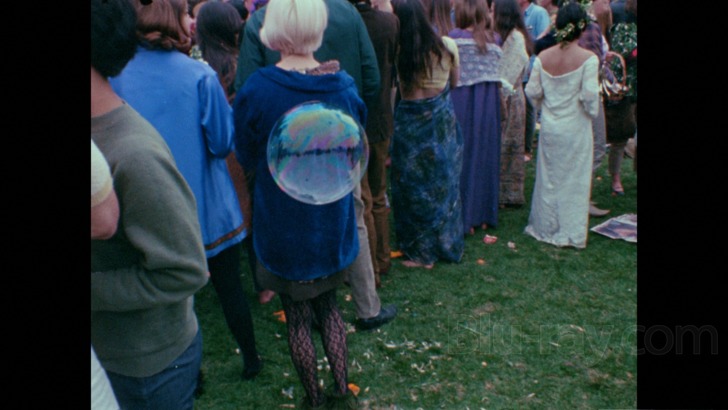
This freewheeling documentary might cheekily be described as "your Les Blank documentary on drugs", and while the imagery is on the psychedelic side, the feeling of unbridled joy this piece offers is undeniable. Technical merits are solid, and God Respects Us When We Work, But Loves Us When We Dance comes Recommended.
Similar titles
Similar titles you might also like
(Still not reliable for this title)

Sworn to the Drum: A Tribute to Francisco Aguabella
1995

Dry Wood
1973

Spend It All
1971

Sprout Wings and Fly
1983

A Well Spent Life
1971

The Blues Accordin' to Lightnin' Hopkins
1968

In Heaven There Is No Beer?
1984

Hot Pepper
1973

Gap-Toothed Women
1987

Yum, Yum, Yum! A Taste of Cajun and Creole Cooking
1990

The Maestro: King of the Cowboy Artists
1994

Always for Pleasure
1978

Garlic Is as Good as Ten Mothers
1980

Anthem
1991

One More Time with Feeling
2016

Koyaanisqatsi
Theatrical and Demo Versions
1982

The Velvet Underground
2021

Powaqqatsi
1988

Soul Power
2008

A Poem Is a Naked Person
1974